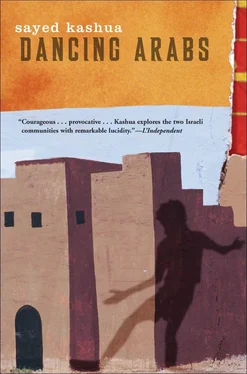In twelfth grade, the kids in my class started running in the parking lot, getting into shape for the army. They were taken to all sorts of installations and training camps, and I received a bus pass and a ticket to the Israel Museum. Sometimes soldiers in uniform came to our school to talk with the students, and I wasn’t allowed to take part. Our teacher always apologized. He was embarrassed to have to tell me it wasn’t for me. In twelfth grade I understood I wouldn’t be a pilot even if I wanted to be, not only because I wasn’t fit and my grades weren’t good enough. There was no way they would even call me up for the screening tests. I sure had a good laugh at my father.
That day, Mother and Father stayed home from work. They dressed up, and an hour and a half before the appointment they got in the car. They knew they mustn’t be late. They had to look like parents. The night before, they’d come to pick me up at the hospital. The school guidance counselor had taken me to the Emergency Room at Shaarei Tsedek hospital. How I screamed at her when I heard she’d asked my parents to come! I’d shamed them in the worst way. And I’d shamed myself too. Now I’d hate myself even more.
I just kept praying: Don’t let my parents find out. Don’t let my father find out. But now they knew. They came to the hospital and saw me having my stomach pumped. They talked with the guidance counselor and took me back home to the village. My father’s friend Bassem was with us. He and my father had been playing chess when the counselor called, and he offered to go along to see how I was doing.
Now I remember how this Bassem stood over my bed at the hospital and asked, “What’s wrong with him? What’s wrong with him?” And Father answered, “It’s all because of that bitch of his, the Jewish whore.”
I’d been tired and dizzy all the time. I could hardly fall asleep. I didn’t sleep more than two hours a night, and I was having strong headaches. This had been going on for a few months. I couldn’t concentrate, I couldn’t think or sleep or even simply sit still. There was a strange buzzing in my ears, and it wouldn’t stop. Headache pills never helped me, and the CAT scan didn’t show a thing. The neurological tests were normal too.
One weekend when I had gone home, Mother took me to Amneh, our neighbor, Grandma’s friend. She said her daughter was a nurse, and she wanted to take my blood pressure. Amneh’s older daughter really was just studying nursing then, but she had a blood pressure gauge. She took my pressure and said it was high.
That’s when Amneh got to work. She brought a handkerchief and tied a knot and put some salt into one corner; then she muttered some prayers and started rubbing the handkerchief around my head. She said it was all because of the Evil Eye, and with Allah’s help it would soon be over. She said she was convinced it would work, because she’d yawned as she’d applied the handkerchief, and also because the salt had melted.
The pain persisted, and the hypertension pills didn’t help. A month later, on one of my visits home, Father said he thought it had to do with my eyesight. I was having headaches because I was studying so hard, and because all those books and computers must have ruined my eyes. He said a friend of his in Taiyiba, an eye doctor, had told him this. He said the friend’s name was Dr. Majed, and he suggested that we go see him at his clinic.
I agreed. The idea of wearing coke-bottle glasses like John Lennon’s appealed to me, but I knew how much I really read and how much time I actually spent at the computer.
On our way there, I tried to doze in the backseat. I didn’t want Naomi to see me with my eyes swollen again. In fact, Dr. Majed was a psychiatrist, the director of the mental health clinic in Taiyiba. He asked us to come in the afternoon, when there were almost no patients left at the clinic. There was only one woman there, who kept rocking back and forth. Dr. Majed let her in first, renewed her prescription, and then invited us in. With him in the room was a young man, probably an intern, maybe a psychologist. Actually, he may have been a social worker.
Dr. Majed asked me how I was feeling. “Not very well,” I answered. He asked if I was having problems at school, and I said everything was great.
Dr. Majed said he had heard from my father that I was in my third year at the boarding school, I was about to start my matriculation exams, I was having recurrent headaches, and the pain was keeping me from concentrating on my studies. Dr. Majed said I was depressed, and prescribed some pills, doxepin 10. “Take one of these a day,” he said, “and things will work out fine.”
I did, and the pills helped me sleep a little. They made me tired, heavy. My face became bloated, but I felt they were working. I really wanted to be an official depressive like Nick Drake, like Kurt Cobain. I had a renewable prescription, and I got the pills myself. They weren’t expensive, and pretty soon I started taking two a day. Then I increased the dose to doxepin 25, and I got in the habit of popping a pill every time I felt a headache or depression coming on. I walked around in a daze, but nobody asked me why. I’d reached a point where nobody expected anything of me anymore, a condition where it’s best not to interfere.
Naomi came to see me every now and then. She said she was planning to study psychology. She was going to ask for a deferral of her army service so she could study first, and she had to get good grades on her finals. When the exams were over, we’d split up; I knew that. That’s what her mother wanted. She said boarding school was a world apart, and as long as we were there she didn’t mind that her daughter had an Arab boyfriend. She said she had nothing against me, except it was too bad my name wasn’t Reuben or David.
On the day before the final in Arabic and two days before the last exam in math, I swallowed a whole pack of doxepin 25, ten pills at once. I wanted to sleep. Naomi came to my room. She knocked on the door and I didn’t hear her. She knew I was there. I hardly got out of bed in those days. Where would I go anyway? She opened the door and tried to wake me. I could hear her, I could see her, I woke up, but for some reason she thought I was still asleep. I saw her run out and return with the guidance counselor. What was the guidance counselor doing at school at that hour?
Today we had an appointment at the mental health clinic in Jerusalem, with the psychologist in charge of the adolescents’ clinic. My parents were told they had to come.
“What are you going to tell them?” my father asks. “Did you tell the guidance counselor anything? Did you talk to them about me?” He mentions Bassem and says he knows about how I’ve screwed up my studies and ruined everything on account of some girl.
I tell my father I haven’t told them anything because there’s nothing to tell.
He calms down when he realizes he’s not going to come under attack, and nobody is about to blame him for my condition. He’ll emerge from the whole thing with his reputation intact. As always.
My mother tries to say everything’s going to be okay and I should still consider taking the matriculation exams, but that whatever I decide will be all right, because she’s sure I’ll manage. She says she doesn’t understand how I wound up like this. “We knew you had it tough,” she says, “but we didn’t realize it was this bad.”
I hear them talk. They’re interfering with my attempts to concentrate in the backseat, to think about how I have only one more day to see Naomi. To try to imagine our last kiss.
My father launches into another monologue. He says everything he did was for me, to educate me. “Do you know that in England you’re allowed to hit schoolchildren to this very day? It’s an educational approach.”
Читать дальше












